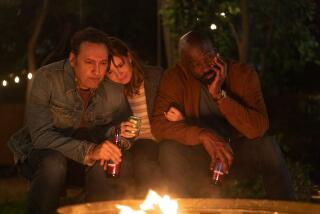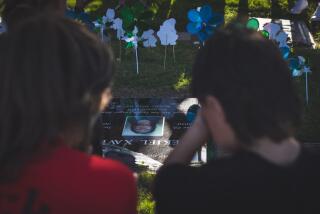Dying Father Struggles to Say Goodbye
NEW HAVEN, Conn. — Editor’s Note: A reporter chronicled the lives of a dying single father and his four children for six months as he prepared them for how life would be when he is gone.
*
NEW HAVEN, Conn. -- The children tumble in from school, all breathless excitement and questions.
“Daddy, can we go to the store?” “Daddy, can I call my friend?” “Daddy, can we go to the park?”
It’s late spring, and for a moment, Felix Del Valle forgets his disease, his tormented body, his impending death.
Slumped in his wheelchair, he beams, shaking his head at the blessing of being home another day.
He knows what the world sees: a 46-year-old man with Lou Gehrig’s disease, a man whose legs and arms don’t work anymore, a man with no money and no means of support, a man who will not witness the future of the four children he has raised alone.
His kids don’t understand the shadow of death like adults do, not even his oldest, 11-year-old Kyia, who feeds him and wheels him and shaves him and fakes his signature to cash his welfare checks.
Sometimes Felix wonders: Will she learn to be a child again when I am gone?
But what no one understands, not his children nor his friends, not the stream of well-intentioned social workers and volunteers, is that it’s not dying that is breaking Felix’s heart.
It is the decision he must make by summer’s end, to hand over Kyia and Janet, 10, and Felix Jr., 8, and Crystal, 6, to the kindhearted family that has offered to adopt them.
Felix is grateful beyond words that his children will be raised together after he dies.
But he dreads the day they can no longer live as a family in their little apartment on Day Street, when his children move on to their new life and he moves into a nursing home to die.
*
In a life that hasn’t been marked by much luck, the happy moments shine: The day in January 2000 when Felix won sole custody of his children from their abusive, drug-addicted mother.
The day Lori Burgess offered to become a mother to his children when he succumbs.
It was October 2001, the day after Felix had been told he had an incurable disease that would eat away at his muscles and nerves and kill him within two years.
He stumbled back to work in a daze of disbelief, his mind frozen by one thought: What will happen to my children?
Like everyone in the Long Wharf office complex, Burgess, an administrator with the Visiting Nurse Assn., knew Felix as the ever-smiling sandwich man, whose cries of, “Hello, gorgeous!” made all the ladies blush.
And so when Lori saw Felix’s face contorted in sadness and fear, she sat right down and asked him what was wrong.
Through tears, Felix told her about his death sentence, about his biggest fear -- that his children would be sent to foster homes, that the family he had struggled to keep together would be torn apart.
But where would he find someone to take on four children?
That night, Lori talked to her husband, David, a minister, and their children, David Jr., 14, Jelisa, 11, and Zachary, 5.
What if we opened our home to these children? they asked. What if they become part of our family forever?
*
“Daddy is so happy,” Kyia says, beaming, as she feeds Felix mouthfuls of hamburger in his wheelchair at home. “Because he knows that when he is in heaven, we will be with a good family, with our very own mommy and daddy.”
Their father turns away so she won’t see his tears.
It is early June, eight months after his conversation with Lori, and he is still overwhelmed with gratitude. But the transition is proving harder than he imagined.
At first he and Lori were feted like heroes.
Churches and schools and businesses threw fund-raisers, setting up a fund for his children and another for the Burgesses to buy a bigger home. A Yale law professor took on Felix’s legal case, working out an agreement for the long-term guardianship of the children. There was even a weeklong trip to Walt Disney World in December.
“I’d never seen my children so happy,” Felix said.
But it’s a cruel kind of happiness for a father to witness his children’s delight and know it is connected to his death.
Felix does the best he can, talking to them while he still has his voice, telling them about his life -- growing up in a home for abandoned children in New York City, the basketball exploits that won him a college scholarship, the times he collected cans to make ends meet.
“You must love each other,” he tells them. “And you must always stay together.”
Sometimes they don’t want to hear about his dying. Sometimes they taunt him. Sometimes they cry. Mostly they just adore him.
Kyia is the little mother-figure who wheedles her father to eat more, scolds him when he gets depressed, and coaxes laughs from him with her crazy dancing and silly smiles.
Felix Jr. is a gentle son, always hugging his dad, and sometimes begging him to live for another 1,000 years. Little Crystal just beams at the world with her lopsided grin.
And then there is Janet -- lanky, rebellious Janet who bristles with confusion and hurt and fear. At 10, she has no idea where to put all her emotions or how to control them.
“I worry about all of them,” Felix says. “But I worry most about Janet.”
*
Lori’s mother, Peggy, jokes that even as a child her daughter was a magnet for the wounded and the lonely.
If anyone can take on another four children, Peggy says, it is this couple, high school sweethearts who stayed in the town where they grew up, close to a huge network of family and friends, and to the Union Temple church that is their spiritual home.
The Burgesses shrug off the wonder of friends. It’s not a sacrifice, they say. It’s a joy.
The children make it easy.
Their first meeting -- a Halloween party a year ago -- was such a success that the little ones cried when they parted.
Kyia and Jelisa acted as if they had been sisters all their lives, braiding their hair, painting their nails and excitedly planning how to decorate their bedroom.
David Jr. took on the task of teaching little Felix how to throw a football and other “manly” activities.
Only Janet seemed unsure of her place in this strange new world.
In mid-July, Janet throws a tantrum that, even by her standards, is out of control. Screaming, raging, crying, flinging keys at Kyia and an iron at Crystal.
Felix despairs. He asks Kyia to dial the crisis number the social worker has given him.
“I can’t take care of her anymore,” he sobs.
A few hours later, Janet is in the children’s psychiatric unit of St. Raphael’s hospital, clinging to her father as a counselor explains that she needs to be away from her family for a while.
Felix knows that it is probably the first of many visits.
There are times when Felix wonders if his illness was all part of God’s plan -- to give his children a better life.
There are times when he wonders if it would be better to die quickly, in a car crash, or a plane crash. Then he thinks of the fathers who died on Sept. 11. And he feels lucky he has time to say goodbye.
But planning the final farewell gets harder.
He arranges for the children to be baptized so each will have godparents -- another set of protectors when he is gone.
But he cannot bring himself to part with them at the end of summer, as agreed.
“Soon,” Felix whispers. “I just need a little more time.”
But time is running out. The disease is now attacking his lungs. Even the children can see him slipping away.
On Sept. 20, the state Department of Children and Family Services intervenes. The children are picked up after school and brought to the Burgesses.
Felix is left alone with a piece of paper that says he is too sick to take care of his children.
*
Oct. 10. The Burgess home is more beautiful than he imagined -- like a storybook house with its pale blue walls and dark blue trim. Inside, a fire glows in the hearth and a pot bubbles on the stove.
The children tumble into his arms, Crystal waving her sparkling new slippers, Felix Jr. smothering him with hugs, Kyia dancing a silly dance and singing a silly song.
They are happy and excited. And they are home.
Felix is overwhelmed. His eyes fill, but he doesn’t cry.
He still worries about Janet, who is back in the hospital and who is being sent to a home for troubled children when she gets out.
But he no longer feels so sad.
Sitting in his wheelchair in this warm, noisy house with the couple who will become his children’s parents, he feels happy. And sure.
“They are in the right place,” Felix says, as a friend drives him away.
*
‘The Del Valle Children’s Fund is at Chase Manhattan Bank, c/o Bill Rosadini, 234 Church St., 6th floor, New Haven, CT 06510.


